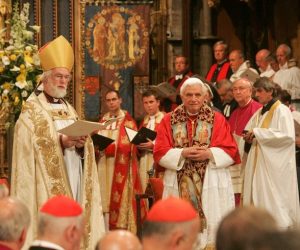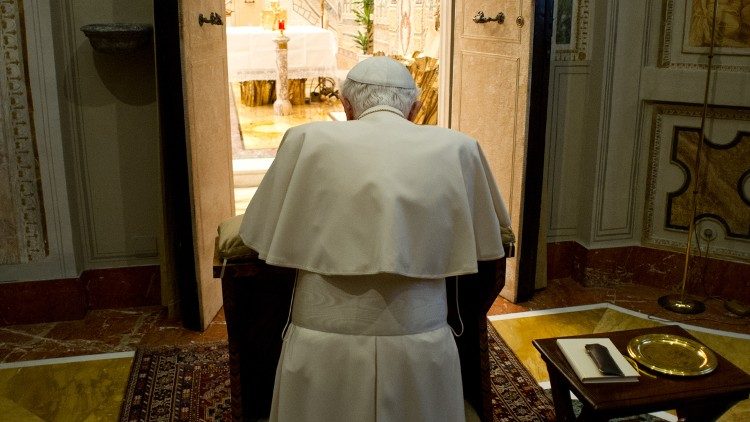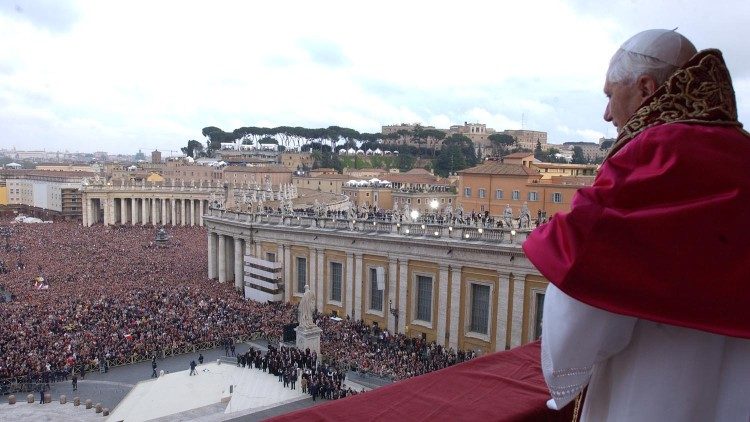Main image: Pope Benedict XVI at the Central Loggia of St. Peter’s Basilica on the day of his election. (Image source: Vatican News)
Marco Carvalho
Cardinal Ratzinger was hailed as one of the most prominent theologians of the last century, if not one of the most influential ever. In your opinion, what is Pope Benedict’s most enduring legacy?
Father José Mario Mandía: The Catechism of the Catholic Church and the Compendium of the Catechism, which were published in 1992 and 2005 respectively, during the pontificate of St John Paul II. Then Cardinal Ratzinger was the prefect for the Congregation for the Doctrine of the Faith, and it was under his direction that this project came to fruition. The Catechism of the Catholic Church was the first official Catholic catechism published after 400 years and sold more than three million copies in different languages and is read even by non-Christians.

Father José Mario Mandía is a visiting professor at the University of St Joseph, Macau, and former director of O Clarim
Why is Pope Benedict’s theological vision important for the future of the Church?
J.M.M: I think that at the core of Pope Benedict’s XVI theological vision is his Christ-centeredness and this vision indicates the direction for the future. This, of course, is not a departure from previous Church teaching, but he insistently hammered on this idea. When he spoke to young people, he told them “Dear young people, the happiness you are seeking, the happiness you have a right to enjoy has a name and a face: it is Jesus of Nazareth, hidden in the Eucharist. Only he gives the fullness of life to humanity! With Mary, say your own ‘yes’ to God, for he wishes to give himself to you.”
He himself made this vision his personal project. Two specific examples that show this are his pilgrimage to the Shrine of the Holy Face in Manoppello on 1 September 2006 and the trilogy Jesus of Nazareth (2007). When he visited Manoppello, he said, “As the Psalms say, we are all ‘seeking the Face of the Lord.’ And this is also the meaning of my Visit. Let us seek together to know the Face of the Lord ever better, and in the Face of the Lord let us find this impetus of love and peace which also reveals to us the path of our life.”
In Jesus of Nazareth, the Holy Father explained that “this book is in no way an exercise of the magisterium, but is solely an expression of my personal search ‘for the face of the Lord’ (cf Ps 27:8).”
What would you say was the most important moment of Pope Benedict’s pontificate?
J.M.M: Probably it was the moment that he accepted the election as successor of Peter on 19th April 2005. That opened the way to many other important moments during his pontificate.
What were the most important achievements of the Church during the eight years he was the holder of the Chair of Saint Peter?

Pope Benedict XVI at Westminster Abbey in 2014.
(Image source: https://www.praytellblog.com)
J.M.M: Pope Benedict’s Christ-centeredness led him to work to revive the beauty of the liturgy and restore the spirit of adoration and worship. One of Pope Benedict’s key assets was his ability to engage in dialogue with groups outside of the Church, including the schismatic Lefebvrians and Moslem scholars, particularly after his Regensburg Address on 12th September 2006.
One significant achievement was finding a way for Anglicans to enter into communion with the Catholic Church, while permitting them to retain some of their traditions. This was achieved through the Apostolic Constitution Anglicanorum coetibus that created “personal ordinariates for Anglicans entering into full communion with the Catholic Church” (4 November 2009). As head of the Congregation for the Doctrine of the Faith, Cardinal Ratzinger started an investigation on Marcial Maciel, founder of the Legion of Christ and the Regnum Christi movement. The investigation uncovered drug use and sexual abuse. In 2006, Pope Benedict XVI ordered Maciel “to conduct a reserved life of prayer and penance, renouncing every public ministry.”
In your opinion, what were the qualities that best defined Pope Benedict?
J.M.M: For me, one quality that stood out was his deep and sincere humility. And because of this, his faith was robust, his hope unshakeable and his charity exemplary. And I would add three more: humanity, boldness and creativity.

Pope Benedict XVI in prayer. (Image source: Vatican News)
I will forever remember what he said in his homily during his installation to the Petrine ministry: “Dear friends! At this moment there is no need for me to present a program of governance.… My real program of governance is not to do my own will, not to pursue my own ideas, but to listen, together with the whole Church, to the word and the will of the Lord, to be guided by Him, so that He himself will lead the Church at this hour of our history.”
And I will never forget those words from his first Encyclical Deus Caritas Est (no 35): “‘We are useless servants’ (Lk 17:10). We recognize that we are not acting on the basis of any superiority or greater personal efficiency, but because the Lord has graciously enabled us to do so. There are times when the burden of need and our own limitations might tempt us to become discouraged. But precisely then we are helped by the knowledge that, in the end, we are only instruments in the Lord’s hands; and this knowledge frees us from the presumption of thinking that we alone are personally responsible for building a better world. In all humility we will do what we can, and in all humility we will entrust the rest to the Lord. It is God who governs the world, not we. We offer him our service only to the extent that we can, and for as long as he grants us the strength. To do all we can with what strength we have, however, is the task which keeps the good servant of Jesus Christ always at work: ‘The love of Christ urges us on’ (2 Cor 5:14).”


 Follow
Follow


